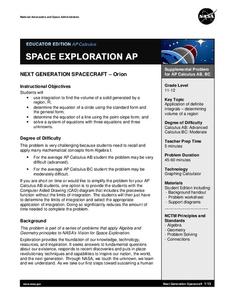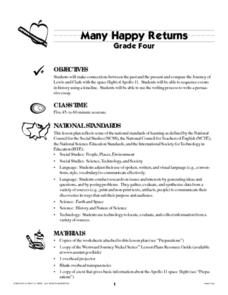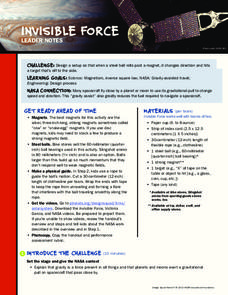Curated OER
Fractions, Decimals, and Gravity
Students discuss how weight is directly related to gravitational force on a planet. Students then choose Space Traveler as companion and compute how much their guide weighs on various planets, based on each planet's relative surface...
Curated OER
Newton's Third Law
Students describe an everyday situation which demonstrates Newton's Third Law. They state Newton's Third Law;"Every action has an equal and opposite re-action, or every force has an equal and opposite force" in their own words. ...
Messenger Education
Design Challenge: How to Keep Items Cool in Boiling Water
Keeping items cool in boiling water... what? This engaging activity challenges high school learners to build a container that keeps butter in a solid state when placing the container in boiling water. Groups use previous knowledge and...
Curated OER
NEXT GENERATION SPACECRAFT-Orion
Students investigate the volume of a solid. In this calculus lesson, students use integration to find the volume of a solid generated by a region, the Orion crew module.
Curated OER
Starquest
Students study the history and cultural interpretation of a celestial body or constellation. They create technology based presentations of the information.
Curated OER
Eye in the Sky
Students use the Internet to broaden their knowledge and understanding of the Hubble Space Telescope by participating in an Internet scavenger hunt, searching for information about the objectives, past successes and repair of the telescope.
Curated OER
Detecting Meteors by Radio in the Classroom
Twelfth graders describe and interpret the science of optical and radio telescopes, space probes and remote sensing technologies (Unit E) They explain the role of radio and optical telescopes in determining characteristics of stars and...
Curated OER
Many Happy Returns
Students compare the journey of Lewis and Clark with the space flight of Apollo 11. Students sequence events using a timeline. Students write a persuasive essay trying to persuade the people of the US to support space exploration.
Curated OER
In a Galaxy Far, Far, Far Away
Sixth graders compare distances between objects in the solar system. They investigate how light years are measured and when using them to measure how distances compare with one another. They write an essay exploring the possibility of...
Curated OER
The Starry Night Time and Day Time
Second graders complete a unit of lessons on the solar system. They complete various art projects inspired by Van Gogh's 'Starry Night,' create a moon phases book, create a moon phase wind chime, develop a timeline of space exploration,...
Curated OER
Earth and Beyond!
High schoolers investigate one or more of the following topics and develop a plan for the future regarding it: global warming, lunar exploration, space travel, Mars exploration, or terraforming. They disucss the audio files and the...
Curated OER
Applying For The Mission
Students participate in a live simulation of traveling through space as part of a large science unit. They are encouraged to go into the community and ask for participation from parents and relatives. Students reflect upon their own...
Curated OER
Nasa's Return To Flight: Testing In
Learners explain basic components of the space shuttle stack and the chemical fuel makeup and storage used on the external tank of space shuttle. They discuss findings of Columbia mission accident. and the safety improvements that have...
Curated OER
The Cassini Robot
Pupils compare the functions of a robot to that of the human body. In this technology lesson, students identify the important components of the Cassini robot that would enable it to carry out space missions. They design and build their...
Curated OER
We're On A Mission!
Students examine the Mars Exploration Rover mission. In groups, they design their own mission while participating in a webquest. They write an essay using the information they gathered to propose their mission to the President. They...
Science 4 Inquiry
It's Not All Visible
Electromagnetic waves travel though empty space, something no other wave type can accomplish. Young scientists learn more about the entire spectrum of electromagnetic waves. They sort cards and apply their knowledge to create models of...
University of Colorado
Distance = Rate x Time
Every year, the moon moves 3.8 cm farther from Earth. In the 11th part of 22, classes use the distance formula. They determine the distance to the moon based upon given data and then graph Galileo spacecraft data to determine its movement.
PBS
Invisible Force
Investigate invisible forces. Young engineers design a setup that changes the direction of a steel ball using a magnetic force. The purpose of the setup is to model the gravitational pull of spacecraft by planetary bodies.
Curated OER
Measurement and Algebraic Thinking
Comparatively speaking, does a bug travel farther than a human in 10 seconds? Get a bug and measure how far it travels in 10 seconds. Have a human team member run for 10 seconds and calculate the distance ran. Answer the question,"Who...
Cornell University
Sound Waves
How does sound travel through different mediums? Scholars explore this question by creating and observing sound waves as they learn the difference between transverse and longitudinal wave motion. Using their new knowledge, class members...
Curated OER
Amelia the Pigeon: As a Pigeon Flies
Students follow Amelia's adventure on a satellite image. They use measuring and math skills to determine the distance she traveled.
Curated OER
Action-Reaction! Rocket
Students construct a rocket from a balloon propelled along a guide string. They use this model to learn about Newton's three laws of motion, examining the effect of different forces on the motion of the rocket. They measure the distance...
Mr Gym
Street Alleys
Streets and alleys is a cat and mouse game wherein the cat is chasing and trying to capture the mouse. The fun part of this game is that the streets can turn in to alleys and the alleys can turn in to streets. This can be at times...
Laboratory for Atmospheric and Space Physics
Where Are We Going?
Come take a ride on the space bus! Scholars go on an imaginary trip to pick up their peers from the inner and outer planets while reinforcing math skills. First, learners round decimals to identify each planets' distance from Earth....
Other popular searches
- Pros Cons Space Exploration
- Space Travel Brochure
- Space Exploration Timeline
- Timeline of Space Travel
- Space Exploration Time Line
- Drama Space Travel
- 1950 Space Exploration
- Bill Nye Space Exploration
- History of Space Exploration
- Outer Space Travel
- Space Travel Reading
- History of Space Travel























